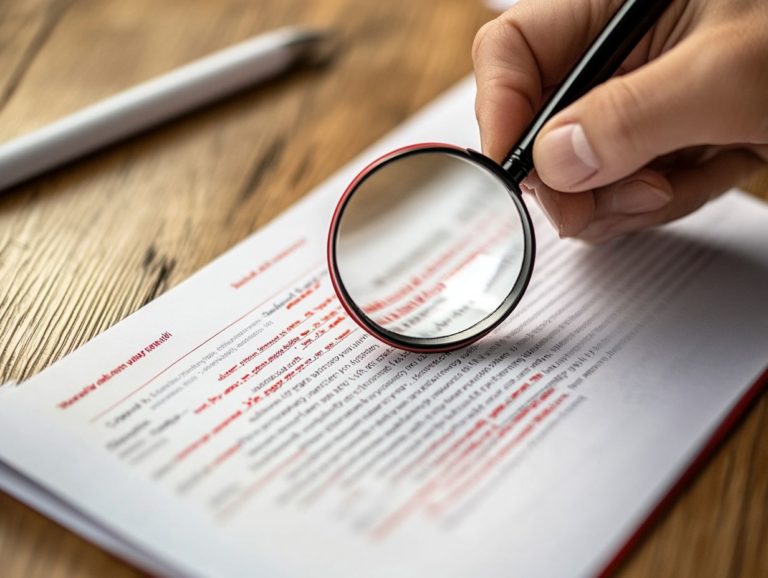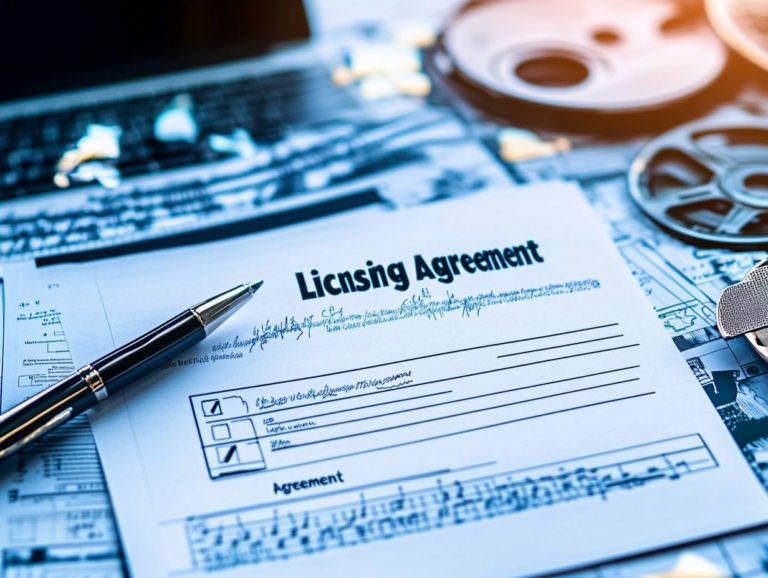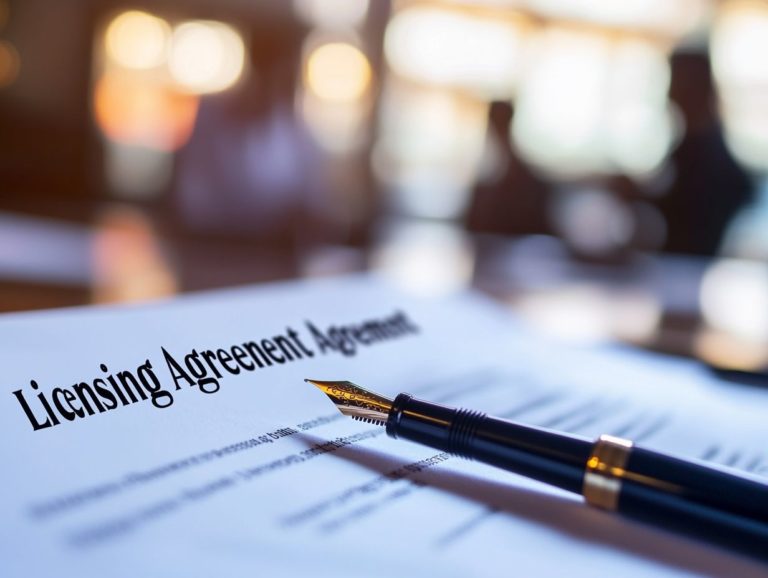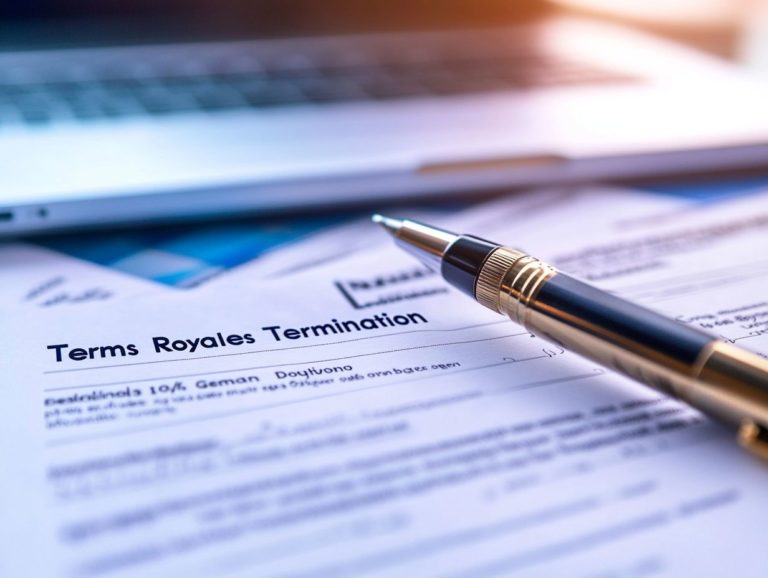How to Draft a Licensing Agreement: A Step-by-Step Guide
Licensing agreements are vital in business and intellectual property. They provide a structured way for parties to share and use valuable assets.
In this guide, you ll learn the essentials of crafting a successful licensing agreement. You’ll understand how to define key terms, identify the involved parties, and navigate the drafting and negotiating processes.
This guide covers enforcement and termination. You’ll gain insights to create a strong agreement that protects your interests.
Whether you re an expert or just starting out, this resource empowers you to confidently navigate the complexities of licensing.
Contents
- Key Takeaways:
- Understanding Licensing Agreements
- Identifying Parties and Intellectual Property
- Drafting the Agreement
- Negotiating and Finalizing the Agreement
- Enforcing and Terminating the Agreement
- Tips for Creating a Strong Licensing Agreement
- Frequently Asked Questions
- What is a licensing agreement and why is it important to have one?
- What are the key components of a licensing agreement?
- How do I determine the scope of the license in a licensing agreement?
- What are the key considerations when negotiating a licensing agreement?
- Do I need a lawyer to draft a licensing agreement?
- What is the process for finalizing a licensing agreement?
Key Takeaways:

- Clearly define the purpose and scope of the licensing agreement to avoid conflicts.
- Identify all parties involved and specify the intellectual property being licensed.
- Effective negotiation and communication are key to finalizing a strong agreement.
Understanding Licensing Agreements
Grasping the details of licensing agreements is essential for anyone navigating intellectual property. These agreements define the rights and duties of licensors and licensees.
By setting clear terms, licensing agreements protect intellectual property and ensure compliance with laws. This way, all parties know their commitments.
Definition and Purpose
A licensing agreement is a legal document that gives you, the licensee, the power to use another party’s intellectual property under defined terms.
These agreements protect intellectual property rights. They allow the original creator to keep ownership while granting you specific usage privileges.
By outlining the scope of use, including limitations and duration, these agreements serve to protect both parties’ interests. They typically detail the framework for royalty payments.
Compliance requirements help monitor and enforce usage terms. Following these guidelines safeguards your rights and fosters a beneficial relationship with the licensor.
Identifying Parties and Intellectual Property
You must identify the licensor and licensee in a licensing agreement to understand their rights and obligations. This understanding lays the groundwork for protecting your creative assets.
Key Players and Assets Involved
In any licensing agreement, the main players are the licensor, who holds the intellectual property, and the licensee, who seeks to use those rights under a contract.
These relationships cover various intellectual property forms, like patents, copyrights, trademarks, and trade secrets. The licensor retains ownership while granting you specific rights, often for royalty payments.
For example, think of a software company that licenses its technology, allowing you to integrate it into your services. Or a fashion designer who licenses their trademark for apparel production, benefiting both parties while protecting their rights.
Drafting the Agreement

When drafting a licensing agreement, you must pay attention to critical clauses. Understanding the process of auditing licensing agreements enhances this approach, making the contract seamless and legally binding, while protecting both parties’ interests.
Important Clauses and Considerations
Important clauses in a licensing agreement include the responsibility clause, payment amounts, renewal provisions, and limitations of liability. Each serves a distinct purpose in protecting the rights of both parties.
The responsibility clause clearly outlines one party’s duties to compensate the other for any losses or legal expenses arising from breaches or claims related to the agreement. This ensures accountability and mitigates potential disputes.
Payment amounts clarify financial arrangements. This clarity creates trust and transparency key elements for success!
Renewal provisions dictate how the agreement can be extended, establishing a framework for future collaboration. This foresight allows for seamless transitions as business needs evolve.
Limitations of liability cap the amount one party may owe the other in cases of damages or losses. This effectively manages risks and reinforces the stability of the contractual relationship.
Together, these clauses form a robust legal framework that safeguards the interests of both parties, ensuring a balanced and mutually beneficial partnership.
Negotiating and Finalizing the Agreement
Negotiating and finalizing a licensing agreement demands your finest communication skills and a readiness to find common ground.
Both parties focus on crafting mutually beneficial contract terms that safeguard their rights and interests, ensuring a balanced and equitable outcome.
Effective Communication and Compromise
Effective communication and compromise are fundamental in negotiating licensing agreements. They set the stage for outcomes that satisfy both the licensor and licensee.
To achieve this, embrace active listening. It allows you to fully grasp the other party’s perspective and concerns. This approach encourages the free flow of ideas, creating an environment where everyone feels valued.
Empathy serves as a crucial bridge, enabling you to see the situation from the other s viewpoint. This fosters trust and openness. By concentrating on finding common ground, you can uncover shared goals that form the cornerstone of your agreement.
Your willingness to compromise can greatly shape the final agreement, often leading to solutions that provide enhanced value and satisfaction for all parties involved.
Enforcing and Terminating the Agreement
Enforcing and terminating a licensing agreement requires a keen understanding of the specific conditions that permit termination. You also need to know the legal remedies available for any breaches of contract.
By grasping these nuances, you can navigate potential disputes with confidence, ensuring that all parties manage the process effectively.
Legal Remedies and Potential Issues

Legal remedies for breaches of a licensing agreement can encompass damages, specific performance, or injunctive relief. Common issues often stem from misunderstandings of contract terms or a failure to meet obligations.
Clarity in contract terms is crucial to avert misunderstandings that could escalate into disputes. Damages compensate for any losses incurred due to the breach, while specific performance may require the breaching party to fulfill their obligations.
Injunctive relief serves as a safeguard against further violations or misuse of the licensed material. Understanding these remedies is crucial! They can help you resolve conflicts quickly and effectively.
Diligently reviewing and negotiating contract terms allows both parties to establish clear expectations, reducing the risk of future disputes and ensuring a seamless enforcement of the agreement.
Ready to take the next step? Review your agreements or consult a legal professional to ensure your interests are fully protected!
Tips for Creating a Strong Licensing Agreement
Crafting a robust licensing agreement requires adherence to best practices and expert guidance. Following tips on how to negotiate a licensing agreement ensures that compliance requirements are met and the interests of both parties are carefully protected.
Best Practices and Expert Advice
Licensing agreements prioritize clarity, thorough documentation, and professional guidance to help you navigate complex legal frameworks. Understanding the legal framework of licensing agreements is essential; involving legal professionals ensures that your rights and those of the other party are fully protected while complying with relevant laws.
Review existing templates carefully, as generic formats often overlook the specific needs and nuances of your unique business relationships. Customizing agreements fosters a deeper understanding and minimizes the potential for disputes, reinforcing collaboration between entities.
By prioritizing these practices, you can establish robust frameworks that enhance trust and pave the way for successful partnerships.
Frequently Asked Questions
What is a licensing agreement and why is it important to have one?
A licensing agreement is a legal document that outlines the terms under which a company grants rights to use its intellectual property creations of the mind like inventions or brand names to another party. It is essential for safeguarding your rights and ensuring both parties understand and agree to the terms.
What are the key components of a licensing agreement?

The key components of a licensing agreement include:
- Names and contact information of both parties
- Description of the licensed intellectual property
- Scope of the license
- Duration of the agreement
- Payment terms
- Restrictions or limitations on the use of the intellectual property
How do I determine the scope of the license in a licensing agreement?
The scope of the license should be clearly defined and can include limitations on the use of the intellectual property, valid territories, and any exclusivity clauses. Careful consideration of the scope ensures it aligns with your business goals and protects your intellectual property.
What are the key considerations when negotiating a licensing agreement?
Key considerations during negotiations include:
- Specific terms of the agreement
- Duration of the agreement
- Payment structure
- Warranties or guarantees
- Limitations on the use of intellectual property
- Termination clauses
Carefully reviewing and negotiating these terms is vital to ensure they are fair and beneficial for both parties.
Do I need a lawyer to draft a licensing agreement?
While it is not legally required, having a lawyer draft a licensing agreement is highly recommended. A lawyer can ensure the agreement is legally binding, enforceable, and can provide guidance on how to protect your rights in a licensing agreement during the drafting and negotiation process.
What is the process for finalizing a licensing agreement?
The process typically involves:
- Negotiating and finalizing the terms
- Having both parties sign the agreement
- Having a lawyer review and make necessary revisions before execution
Careful review of all terms before signing is crucial to ensure that both parties are in agreement and that the agreement is legally binding.
For further assistance, consider consulting a lawyer or getting started on your licensing agreement today!






